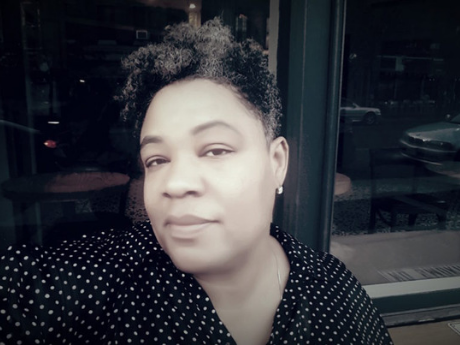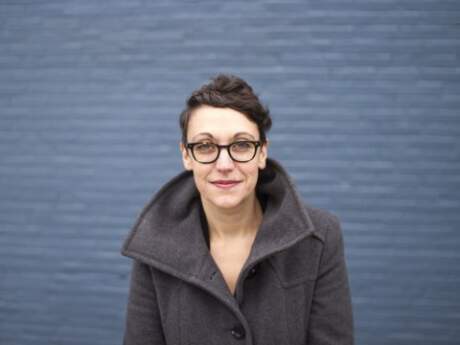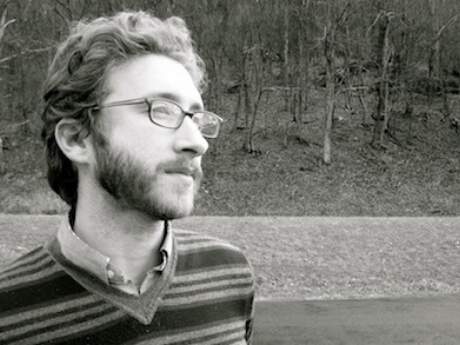New American Poets
New American Poets: Kamilah Aisha Moon

Watching a Woman on the M101 Express
You sit in a hard blue seat, one
of the ones reserved for the elderly
or infirm, a statue of need. Your mouth
open as if waiting for water or medicine, as if
mugged mid-sentence, or some ice age hit
right after terrible news.
Oblivious to the Metro's bump and buck,
to the toddler begging in Spanish to be freed
from her stroller, to my ogling, you sit
embalmed, raccooned or moosed. You have
the kind of eyes that never quite close,
even in deepest sleep, lids
an undersized t-shirt that leaves belly
exposed. Tears navigate moles, veteran
swimmers of your creek-bed face.
I can't stop looking. You can't get over
whatever has happened, so shell-shocked
that birds could land and roost. I want to ask—
just so you know someone
is paying attention, but not enough
to know what ravages. It's rude
to stare. I'm from the South, a suburb
where Grief pulls the shades first,
stays home if indecent. But
your sorrow struts four rows down
from me, strands you an astronaut
on some distant, undiscovered moon.
Bodies to your left and right read papers,
nap, send text messages. You sit in a hard
blue seat, mouth open. I study the pink
of your jaw, and wonder if you'll come back
before your stop comes.
All rights reserved. Reprinted with the permission of the author.
Introduction to the work of Kamilah Aisha Moon
Brenda Shaughnessy
Though the poems in Kamilah Aisha Moon's debut collection She Has A Name are populated with many characters—sisters, mother, grandmothers, lovers, schoolkids and strangers, the dead and the dying, the irrepressible and the lost— they are somehow still knowable intimates sharing our world; Moon brings us in so close it's as if they're sitting right next to me in poem after poem. This poet makes me think of the word "sisterhood" as that which is not only familial or political, not just a kinship or uncomplicatedly feminist as "powerful" but as a shared reality…the sense of belonging to each other, of knowing each other, the way someone watching a shattered woman grieving on a bus can become part of her world, can elicit a longing for connection, to communicate somehow: even though I may not know, believe me, I KNOW.
There's so much compassion here for a sister, a mother, a teacher, a family, and, the most difficult of all, the self. And what, after all, is compassion? If "passion" is commonly used to mean that kind of generic gusto, or erotic fervor, or a kind of kooky enthusiasm ("a passion for fashion!") or a temporary insanity ("crime of passion") it's easy to forget the root of the word is the Latin passio: suffering. Compassion means to "suffer with" and not merely to "understand" or have strong emotion about. It takes on some of the burden and halves it in that action. It is the opposite of feeling for another in order to feel alive oneself, which merely uses the pain of others to benefit the self. True compassion mirrors—refracts, fragments, divides—to allow the one who suffers to feel less alone, not to provide an identity for the mirror. True compassion is rarer than we like to think. This book reveals a motherlode.
This work knows the body and its betrayals, and asks of it even more. Asks more questions. She wants the information, to understand, to use this capacious heart and probing intelligence to discover what else is there? What is hidden? What shadowed or mis-heard? She emerges with answers about the rest of us, those who love each other. She searches for answers and finds the tendons, sinew, connective tissue that hold us together. For what it really feels like to be a person connected by blood or words or love to another person? Moon gets it, and she needs no magic tricks to show us what she knows. The magic is in the way she knows, in how she tells us. And life tricks us well enough, poetry doesn't need to do it to us again. Moon's not a trickster but she is ever-surprising, shows us how what's already there transforms itself again and again as each day is truly new, as each utterance offers a chance to change the air, the view, the future.
I must suggest everyone try to hear this poet read in person: it is unforgettable. She read for the Writers At Newark reading series at Rutgers University—Newark, and during her reading, I felt vulnerable, kept my eyes down, as I was crying and didn't necessarily want my students, colleagues, new Chancellor, etc. seeing how broken open I was by her reading, but then I caught the telltale shoulder-hitch and sniffle from those around me, and, when I dared to look, saw I was not alone in my tears. It's not too often that I sense a crowded room united in the soft voice of a very unassuming poet—but Moon's modesty and calm cannot quiet her power, the force of her passionate and precise language. The room was quiet, we were all part of one entity, and we were not going to miss a single word the way a very thirsty person would not waste a drop of water in the desert or in a life-raft drifting alone at sea. Lots of salt water around, scarcely any precious liquid of replenishment. Kamilah Aisha Moon re-instates our human selves to normal balances.
What a lovely thing it is to see a speaker who takes on pain and who understands enough of suffering to cut the self a break when possible. No pointless self-flagellating here. Guilt and shame are felt and admitted and dispatched in fearless utterance. This poetry knows suffering is to be borne, shared, not produced. This book does major work to make this key distinction, which our social-media-saturated selves are tempted to blur. Kamilah Aisha Moon suffers with those she writes about, and readers are admitted into this generosity; this is why reading her book feels simultaneously like gut-wrenching news and a beautifully warm, enveloping hug in which one feels safe, known, loved.
Aesthetically and emotionally, the work is the love child of Jack Gilbert and Lucille Clifton. But the experience of reading her is its own wonder: she goes so deep into an exploration (a soul search or a spiritual quest) of autism and disability, showing how strange it is that "normal" is normative, that she cannot help but show us that we are all simultaneously unique and pretty darn close together. She faces most everything we are afraid of, and doesn't understand fear as anything but an emotion on a continuum. She doesn't stop at fear. She sits with fear, holds it until it changes its mind and becomes something wondrous, holy. All the things the rest of us fear: loss, death, anguish, debilitation, the unknown, Moon starts a conversation with. Everyone's scared, that's just human, but it's not an excuse to be silent.
Statement
Kamilah Aisha Moon
Our charge as creative makers is to take what already is and reconfigure in fresh, original incarnations. Through interesting and unusual combinations of thought, word and craft, we seek to beat new songs into an animal's old hide like Yusef Komunyakaa's poem "Ode To A Drum"; to begin again and again in new forms, new light casting diverse shadows.
One of my favorite poets is Lucille Clifton. Lucille means light, and she had the amazing capacity through lucid, luminous lines to find the spectacular insights to be mined in ordinary moments, everyday brilliance shining in the most mundane of tasks and situations. She was also famous for saying, "something in me knows how to write better than I do." I also trust the intangible part of us that knows so much without easy articulation; surrendering to instinct and opting to periodically color outside the lines allows for rich mistakes and inadvertent perfection to happen. The hope is to somehow set free some portion of the ineffable whenever possible.
I readily acknowledge that I am an instrument of spirit. The woman I was two weeks ago isn't the woman I am today. Time marries experience to alter us in numerous ways as we interact with the world. The poems I write are receipts of these interactions, lyrical invoices that record the glories and costs of breathing. The poems I read are portals into the brutal beauty of others' journeys, offering the solace that we are connected by our aches, longing and joy. In a world that has a great deal of isolation and ignorance, moments of connection and clarity are godsends.
I aspire through observation, experimentation with language and continuous revision to write about everything human, my version of the changing same. I tried to write She Has a Name with as much of the original emotion felt as possible. William Stafford said, "Dig deep enough into your own story until you reach everyone's story," and this has been a guiding concept for my writing. I wanted to get out of the way, to listen and receive rather than dictate. I had to excavate places that weren't comfortable and to write what came—especially when it didn't match what I may have planned to write about. My charge is to sit in front of the blank screen and attempt to dance with the divine, letting it lead my stumbles into some kind of grace.
Writing poetry liberates and terrifies at once. There are times when I am Wonder Woman with her truth lasso and invisible plane; others when I freeze like an animal wary of the unlatched gate. Poetry has been an indispensable tool in my growth as a human being staring need and desire in the face every single day and having to decide my responses—what to "do" about it all, how to be.
The willingness to get lost and the faith to handle whatever is discovered, is essential to creating something new. And sometimes when something is familiar, we don't explore it as thoroughly as we should; it can remain hidden in plain sight. Known but not understood, thus valued. Poetry allows us to fully value this life as we are living it; to see everything we've seen before on different, fresh terms.


